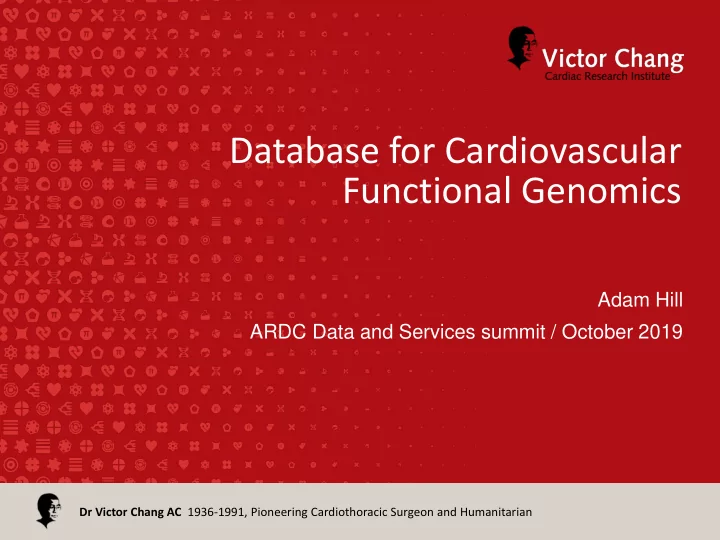

Database for Cardiovascular Functional Genomics Adam Hill ARDC Data and Services summit / October 2019 Dr Victor Chang AC 1936-1991, Pioneering Cardiothoracic Surgeon and Humanitarian
The project • Engagement program/workshop to scope a data resource bringing together genomic and phenotypic data from cardiovascular research labs across Australia. • Specific focus on functional data (electrophysiology, calcium handling, metabolism etc) from iPSC cardiomyocytes to answer questions about disease processes, population variability in drug responses, and identification of new therapies. Workshop involving national leaders from relevant disciplines was held on 27 th August: ‘ Future-Proofing • Cardiovascular Dataset Management: Identifying and Implementing a Collaborative National Approach’ • Organisations involved: ➢ Australian Cardiovascular Alliance (ACvA); ➢ Australian eResearch Organisation (AeRO); ➢ Australian Functional Genomics Network; ➢ NHMRC Accredited Academic Health Research Translation Centres; ➢ Medical Research Institutes (VCCRI, Centenary Institute WIMR); ➢ Local Health Districts (Sydney, Northern Sydney, Western Sydney). ➢ Universities • ~40 participants (NSW, QLD, VIC, SA, WA), peak bodies representing 100s researchers across Australia as well as international consultation
Key Issues 1) Australia has world leading expertise and resources in this domain but data is siloed with little interaction or coordination between groups. While this is currently a limitation, it also presents a significant opportunity. 2) FAIR data – Starting from a very low bar. Data is siloed, not available online, often proprietary, no metadata or licencing. 3) There is no standardisation of data formats or metadata in our domain - this was perhaps the main practical hurdle identified. It was proposed that a minimum information standard for phenotypic data should be published as part of the establishment of the collection. 4) Funding is another major limiting factor in establishing the data collection. Suitable sources identified were: NSW OHMR cardiovascular capacity building fund, MRFF Mission for cardiovascular health, the Ramsey Foundation, NHMRC and the ARDC platforms fund. 5) The Cardiovascular community (and biological community in general) has limited knowledge about what infrastructure (eg. NCRIS funded, cloud) is available. Education/outreach and/or facilitation of interactions with cloud platforms would provide a useful gateway. 6) Although on the whole there is broad acceptance of the advantages of collaborative contribution to a shared collection, there is still some community resistance in life sciences.
Lessons Learnt 1 1) Community requirement is not for raw data, but analysed datasets and/or concierged access. → Analysed data should be the focus of a central resource with standardised raw data linked and available to download. 2) The usefulness/integrity of the proposed data collection is dependent on standardisation of biological samples (not just data collection from the samples). → May require mandating of protocols for lab workflows – likely to be resistance. 3) Ethical requirements for patient-related samples and/or to enable linkage to other patient records are complex but enhance impact/usability. → Keep ethics as broad as possible, implement early, and learn from existing biobanks/linkage spines.
Lessons Learnt 2 4) Administrators of similar databases (eg. Procan: International Centre for the Proteome of Cancer Hosting) reported willingness of eg. AWS to assign resources and expertise to facilitate startup → Preference for hosting on cloud provider. 5) Timeliness – A window of opportunity exists around MRFF both in terms of funding and biological material/data → Coordinate with Australian Functional Genomics network, Australian Genomics Cardiovascular Flagship and AcVA Big data and Bioengineering flagships around researcher engagement and funding. l 6) Specific short-term priority actions were identified as: i. Establishment and publishing of minimum data standard; ii. Appointment of a governance team; iii. Identification of funding opportunities; iv. Engagement with providers (Cloud and/or NCRIS infrastructure) ; v. Recruitment of admin/coordinators/developers;
Acknowledgements Speakers • Prof Louisa Jorm (Director, Centre for Big Data Research in Health, UNSW) • Warran Kaplan (Chief of Informatics, Garvan Institute of Medical research) • Tom Honeyman (ARDC) • Luc Betbeder-Matibet (Director Research Technology Services, UNSW • Dr Tom Briffa (University of Western Australia) • Dr David Elliot (Murdoch Children’s Research Institute) • Prof Sally Dunwoodie (Australian Functional Genomics Network) • Prof Angus Lamond (hiPSCI) Sam Moskwa Loretta Davis
Recommend
More recommend